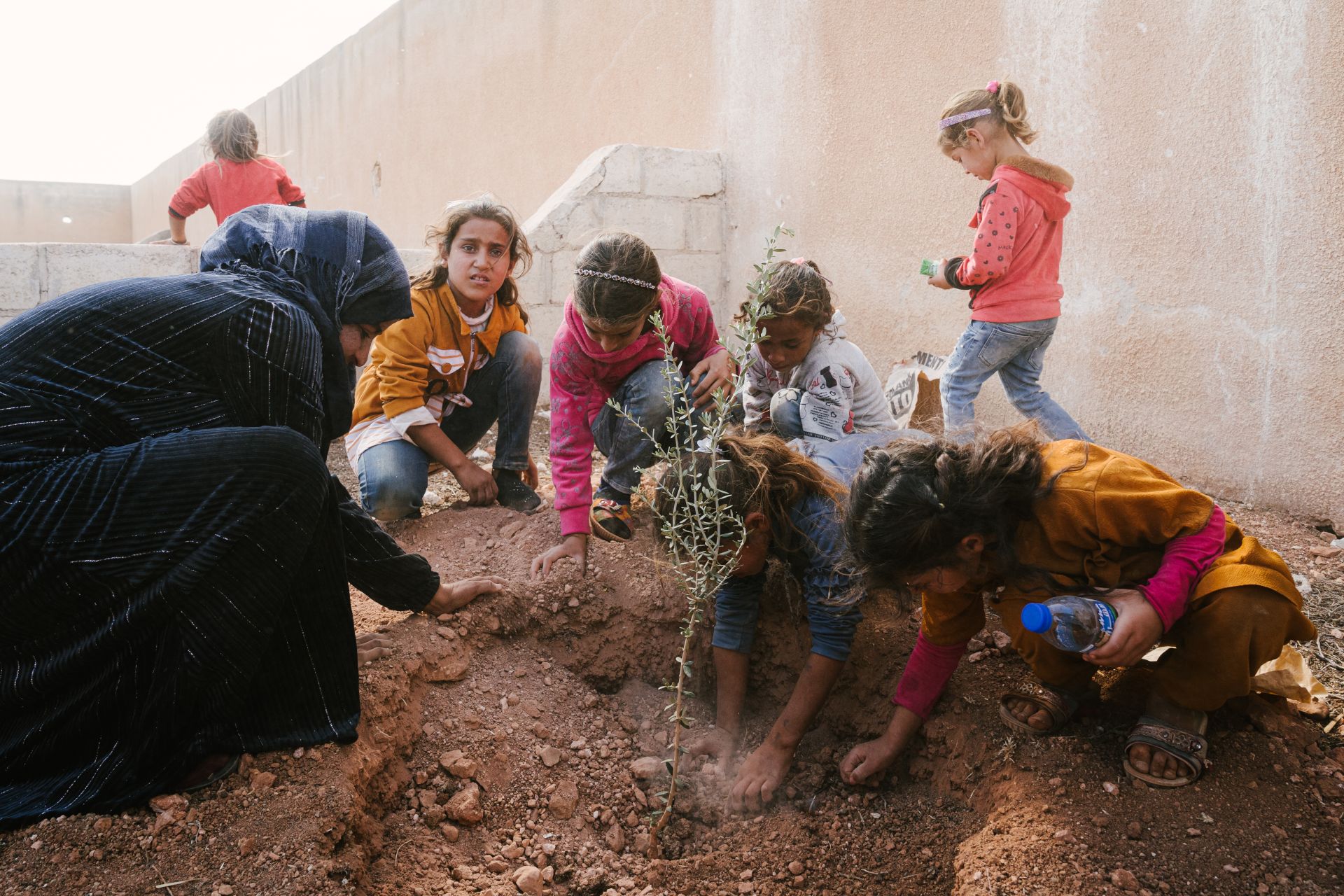A farmer from Aleppo’s countryside, wearing his “hatta,” a white cloth band tightly wrapped around his head, pours seeds into small plastic cups as one might pour coffee. On each cup, names are written in blue marker: rose, endive, coriander.
All this unfolds in a room where a three-star Syrian flag — the one adopted after the fall of the Bashar al-Assad regime in December, representing the uprising that began in 2011 — hangs on the wall, in the rural village of al-Dheibeh, east of Saraqib, in Idlib province.
A young man grabs a handful of soil.
“What will this give?”
“Roses.”
The farmer hands him a small pouch.
“You’ll find the instructions here. You won’t need much water. This little bag is enough for one dunum [equivalent to quarter of an acre], maybe more,” he says.
That day, the farmer is taking part in a seed exchange, but not just any kind: They are traditional or “baladi” seeds, scientifically known as open-pollinated varieties — local seeds inherited from the soil of the Levant. Unlike the industrial seeds called “hybrids,” designed in the laboratory to yield abundantly once, then die, sterile and leaving farmers dependent on the companies that produce them, baladi seeds are living lineages, replanted and reselected each season, in exile or on Syrian soil, by farmers who stayed on their land or who planted wherever displacement had taken them.
It is Oct. 25, the last day of a week-long gathering organized by the Lebanese nongovernmental organization Buzuruna Juzuruna, whose name means “Our Seeds Are Our Roots.” Farmers from across Syria have come together in al-Dheibeh to organize peasant autonomy in postwar Syria. It is the first large farmers’ gathering on Syrian soil since the war — and the symbolic beginning of the NGO’s work inside the country, led by two of its members who have returned from exile to replant their seeds.
Nothing guaranteed that these seeds would survive the war — yet they did, passed from hand to hand, a quiet act of defiance against erasure.
From the crowd in the small hall emerges a familiar figure with green eyes, one of those who helped make this gathering possible. His story, like the seeds in his hands, has crossed borders.
Walid al-Youssef, 41, is one of the founding members of Buzuruna Juzuruna, which was created in 2016 in Saadnayel, in Lebanon’s Bekaa Valley. He left Syria in 2012, after the war began. On 2 hectares, an agroecology training farm brought together researchers, Syrian refugees and Lebanese and French farmers to produce, select and reproduce baladi seeds from the soils of the Levant. The NGO’s name was chosen by a show of hands, during a gathering of some 60 people who had come together to talk about peasant autonomy.
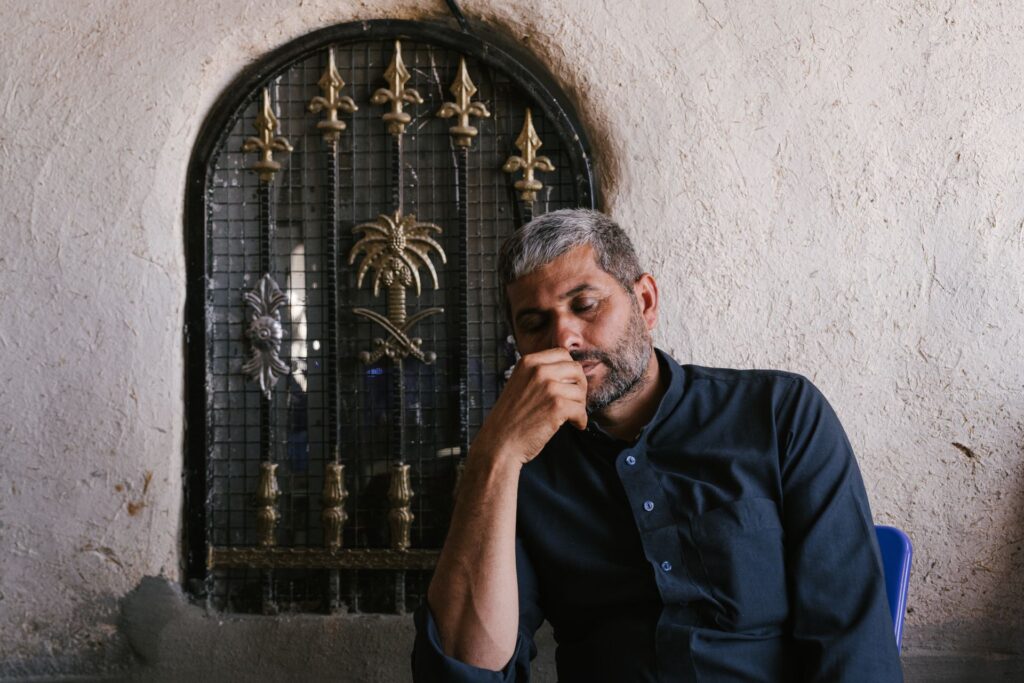
Lara Beau, 35, a French woman and one of the association’s early participants, recalls, “There were those who had the know-how but no land, and those who had land but didn’t know how to make it live, that’s how it started, and as the front line moved forward, families left Syria and joined us in Lebanon.”
BuJu, as they call it, became a living library of more than 300 varieties — ancient wheats, vegetables, medicinal plants, flowers — and, during the war, a living backup of Syrian biodiversity, kept safe in Lebanon while the original lands were devastated by war and exile. From Lebanon, these varieties quietly made their way back into Syria, carried by the hands of farmers determined to replant life where war had erased it.
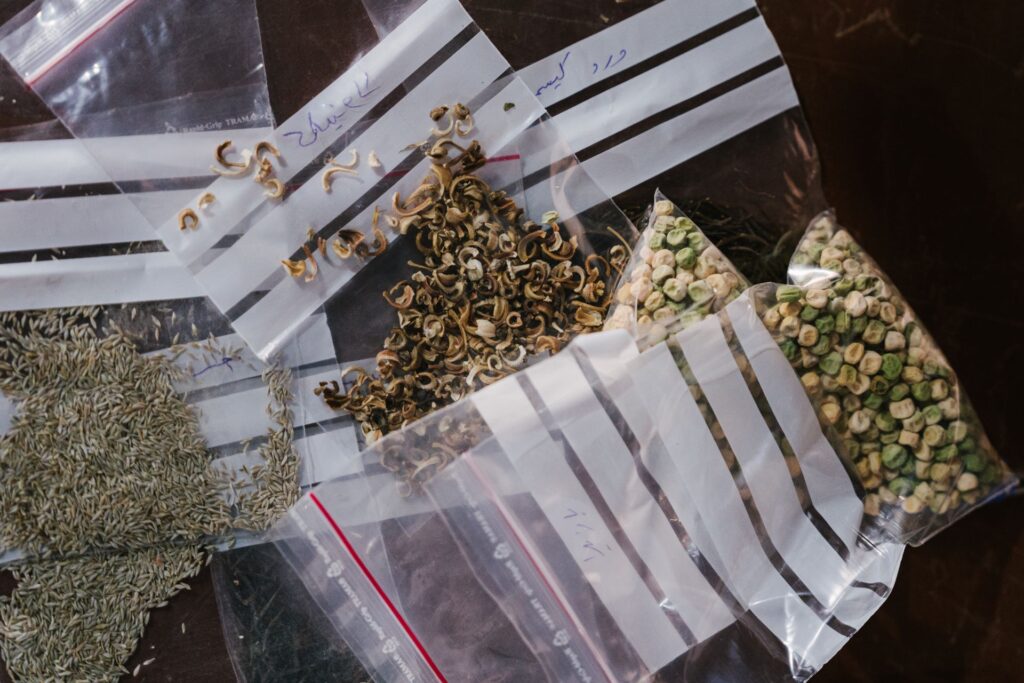
Three weeks earlier, that same Walid — along with his wife, Fodda, 27, had crossed the border back into Syria after more than 10 years of exile in Lebanon. They arrived with their five children and a trunk overflowing with life: paper envelopes, carefully labeled. Inside were seeds of the Levant.
These baladi seeds were the same ones they had grown, multiplied and preserved in Lebanon since 2016, far from their own soil, and which they were now bringing home. Lebanese soldiers had searched their bags, laughing as the seed packets spilled among their clothes.
“What’s all this?”
“Seeds.”
They didn’t understand that those small packets contained far more than seeds — they carried a promise of return.
For Walid, this return was not only personal but symbolic — the beginning of a movement to reclaim Syria’s agricultural independence.
The overwhelming majority of farmers around the world, including in Syria, work with hybrids, says Walid. “We want to restore the bond between farmers and their baladi seeds, those born from the land itself.” He calls it a revolution without weapons, one that began during the war, in Syria’s besieged areas.
The family heads to the village of al-Dheibeh for this farmers’ gathering, a few miles from their own village. Until Dec. 8 of last year, the day the regime fell, al-Dheibeh was still held by Assad’s forces. It was retaken from the opposition in December 2019, after violent fighting, when rebel groups withdrew toward Idlib and the front line tightened around the last remaining enclave.
For four years, Fodda stayed in Syria while her husband, in Lebanon, tried to bring her across. They were reunited in 2015 and, since 2016, have worked the land together, cultivating baladi seeds. Fodda, in her long dress and light scarf, stands a little apart. There’s something quiet about her — a strength that doesn’t announce itself. As Walid speaks, she sends him hearts with her hands, as if they still missed each other.
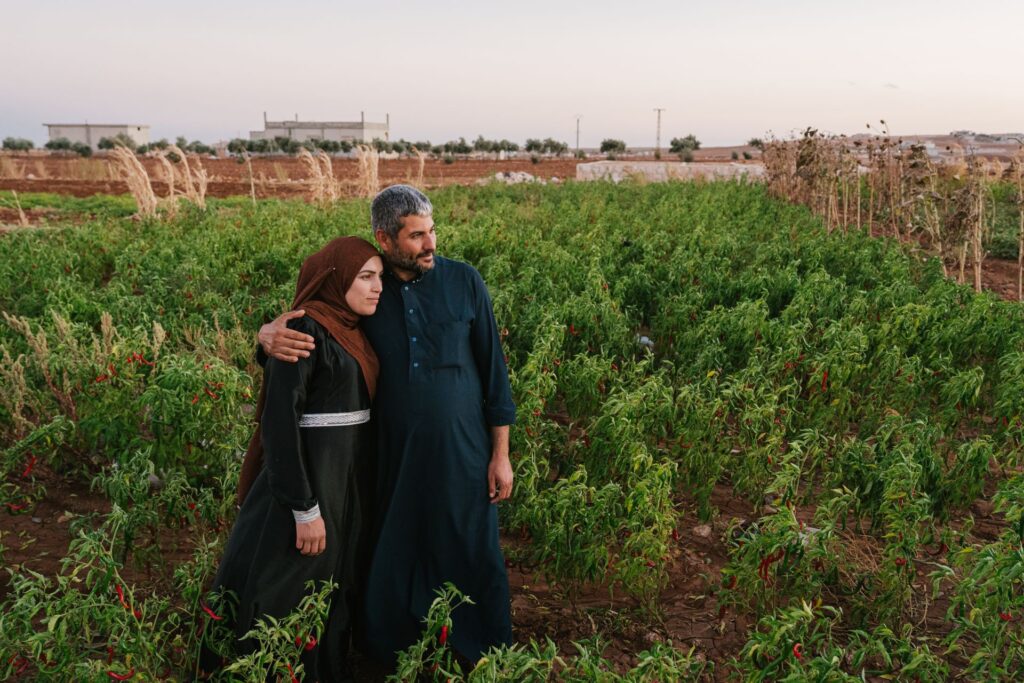
Walid continues: “After the war in Iraq, in 2003, NGOs arrived with sacks of industrial seeds, alien to local soils and climates. Before the war, there were nearly 1,100 varieties of wheat in Iraq; after, only about 30 remained. They lost a large part of their heritage,” he says bitterly.
As Walid speaks, another voice rises in the meeting hall — different in tone, but driven by the same conviction.
During the roundtable, Salman Dakdouk, known as “Kastro,” a Syrian who developed a solidarity farm for refugees in Greece, stood up. “NGOs help you, but in helping you, they paralyze you,” he said, echoing Walid’s call for peasant autonomy.
Around the room, stories of exile echo one another. Most of the 60 participants have lived through displacement, loss and the direct consequences of war. Among them is Azzat al-Mohamed — a farmer who refused to let his seeds die, even in exile, carrying them across borders, from one refuge to another. The gathering is held in his home.
He is 39, from al-Dheibeh. He left Syria in 2016 for Saadnayel, Lebanon. But the farmer took with him one of his most precious belongings: a handful of seeds from his village. After a year working with BuJu, he returned to Syria, displaced to Afrin in the country’s north — still carrying those same seeds, multiplied in Lebanon. “They came from my grandfather,” he says, “And they’ll go to my son.”
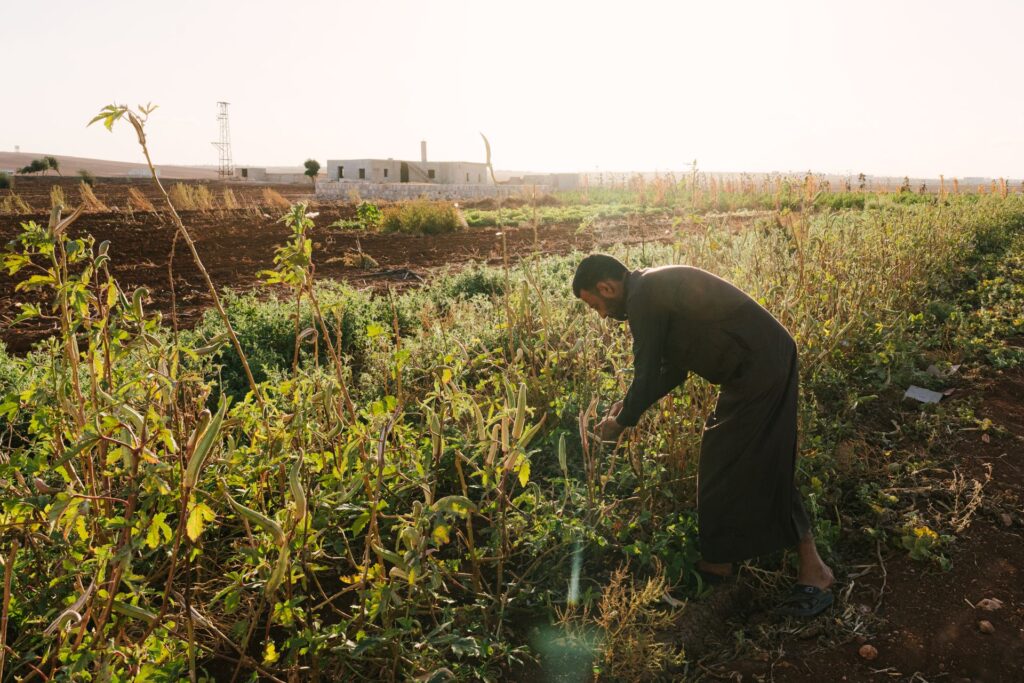
Like others, he speaks of his seeds as if they were family. He talks fondly of his “diamond eggplants,” his “unicorn-horn peppers” and the Jew’s mallow — a leafy Levantine plant used in a sticky, beloved stew — all baladi.
In Afrin, he rented a small plot of land and began cultivating the baladi varieties he had brought with him. Under a tent, with his six children, he lived through five years of toil and patience. He speaks of it simply, without complaint, as if endurance itself were part of farming. “But that’s what saved me,” he says. Other farmers in the camp discovered his vegetables — their abundance, their flavor — and came asking for seeds.“I gave them mine. That’s how they kept living.”
Other refugees had also brought seeds, but theirs didn’t survive — they weren’t adapted to the climate or hadn’t been replanted in years.
“Mine had been replanted in Lebanon, so they hadn’t lost their strength. Seeds you don’t replant eventually die,” he says. “You can keep seeds in a freezer for a year or two, but if you don’t put them back in the soil, they lose their memory.”
On Feb. 1, 2025, Azzat finally saw his village again, eight years later. The first thing he did was to return to the soil the seeds he had carried all that way. He replanted three-branch peppers, a variety that had disappeared in the village during the war, he says, as well as apple tomatoes and “Ain Suda beans,” named after a village in Palestine.
Al-Dheibeh, he says, has about 50% food sovereignty. His dream, he says, God willing, is to make it completely food independent.
His brown eyes, calm and patient, drift back to his childhood. He remembers his father, watering the plants when he was just a small boy. “My father always told me: Preserve your land, preserve your seeds. I see my seeds as my children. I care for them. And like my parents, they feed me.”
That afternoon, the gathering paused for a shared meal of mandi — rice and chicken cooked with spices — a traditional festive Syrian dish. At al-Mohamed’s house, a long table had been set under a plastic tarp. Everyone took a seat. Each came with their own story, but all spoke the same language: that of the soil. Farmers from across Syria — Kurds and Arabs, Druze and Sunnis — had come together in al-Dheibeh. “Politics divides us. The war divided us … but vegetables bring us together,” said Ali Shato, 27, a Kurdish farmer from the northeast.
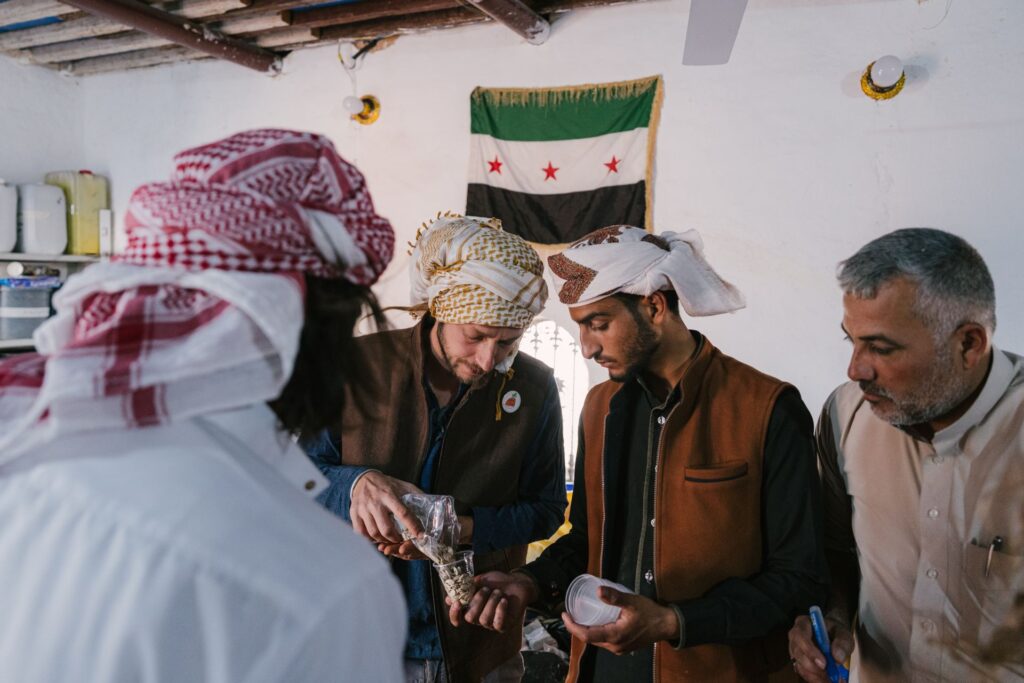
That same spirit extends beyond the meeting hall. In the morning, in al-Dheibeh’s schoolyard, about 60 children gathered to plant olive trees and install a water pump — a small event, part of the gathering, that felt like another beginning. At the heart of this vision of peasant autonomy lies the village. But the challenge is immense. The municipal school, meant to become a pillar for the community, is little more than a half-collapsed shell. The walls are cracked, the blackboard crumbling. Winter is approaching, and the windows have no glass to shield the children from the cold. Part of the building was destroyed during Assad’s bombings in 2017, which also hit the village mosque.
On Oct. 25, the children are repainting the walls of the courtyard’s school. With brown paint, they cover an old slogan: “Bashar, our chief.” Chafak has come to help, alongside her neighbor Fatam. She has three children — 8, 10 and 12 years old. “We’re planting the seeds of a shared agricultural project,” she says. “We’re pooling everyone’s knowledge. We’ve all practiced survival farming in one way or another.”
She lives from her animals and what she grows, like most of the roughly 400 families in the village — a number hard to pin down, given the comings and goings of war and return.
Ahmed, 10 years old, wears a green tracksuit, a red heart drawn on his forehead, a ring on his hand and, on his skin in blue ink, a message written like a tattoo: “For your satisfaction, my mother.” It’s half a gangster sign, half tender. Beside him is his cousin Beihas, 9. Since the fall of the regime, they’ve left their tent life in Lebanon and returned to Syria.“It’s better here. It’s my country,” Ahmed says, in his child’s words.
His cousin is less sure. Born in Lebanon, he spent his whole life there, in a camp. “Over there, they sometimes gave us new school bags or sandwiches,” he murmurs.
Here, they plant instead. Amale, whose name means “hope,” is 9 years old. She helps plant an olive tree, then another, in the schoolyard.
That day, despite the devastation of the place, something is reborn in al-Dheibeh: a shared project and children who, by planting trees, learn to believe in the future.
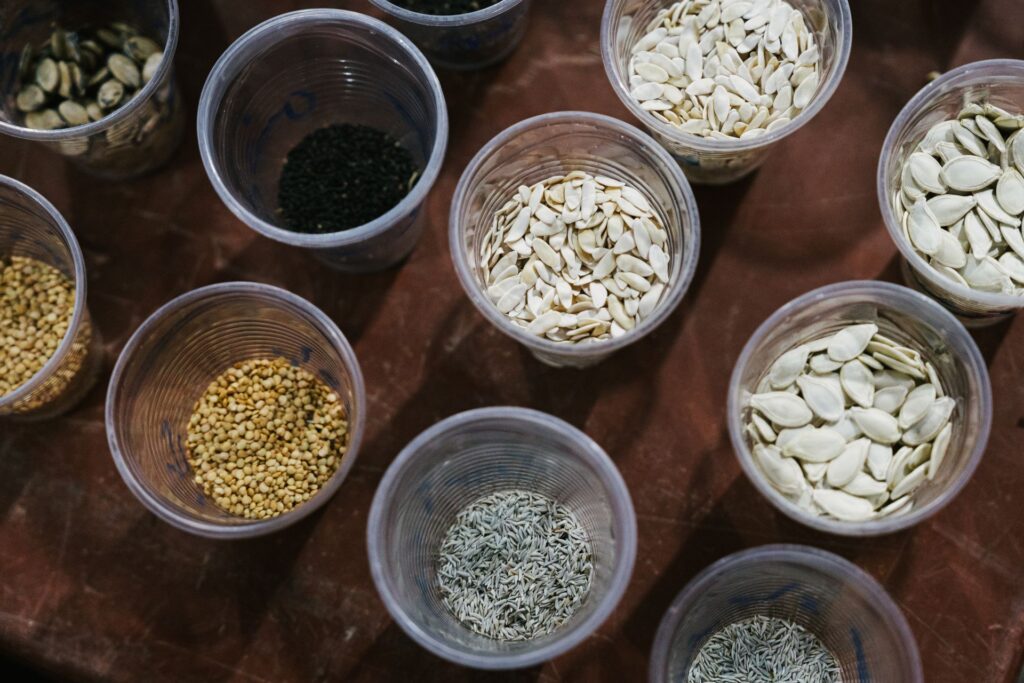
While the children plant the future, an old man nearby tends to the roots of memory. Abu Zoheir, a 67-year-old agronomist, used to work with imported seeds from the United States in the early 2000s. It was his friend al-Mohamed, whom he calls “my two eyes,” who made him realize that by bringing in foreign seeds, “he was also importing disease into his country.”
When his house was bombed in 2019, he fled with his family, injured and empty-handed — his seeds, his field, everything left behind. Displaced in Idlib, thanks to BuJu he managed to plant baladi seeds again, smuggled from Lebanon.
He crushes a handful of dried nettles between his fingers, which he uses to spray his plants. “The soil is like an immune system,” he says. “If you bring in foreign seeds from Bayer or Monsanto, you make it sick.” An old man who lost everything, yet returned to his village — he still believes the Syrian soil can heal.
As evening falls, the circle closes where it began — in the fields of al-Dheibeh. Walid and Fodda, the couple who returned from Lebanon, are in the fields of their friend Azzat al-Mohamed. Areej, 9, one of their daughters, sings facing the rows of young tomato plants. The sun is setting behind her. “They took my land, they put my family in prison. They say my country is now theirs.” Her voice doesn’t tremble. Her name means “delicate scent.” One day, she wants to become a doctor. Next to her, her mother has just replanted her first roses, at home, after 10 years of exile. Even before setting foot back on her native soil, Fodda knew what she would do: plant a medicinal and aromatic garden.
Their house, half destroyed, hasn’t discouraged them. Together, they want to rebuild their life — seed by seed, as if every seed carried a small piece of return.
“Spotlight” is a newsletter about underreported cultural trends and news from around the world, emailed to subscribers twice a week. Sign up here.



